Friday, 18 November 2022, 2pm CET (online)
News
First RDMM-Europe project published
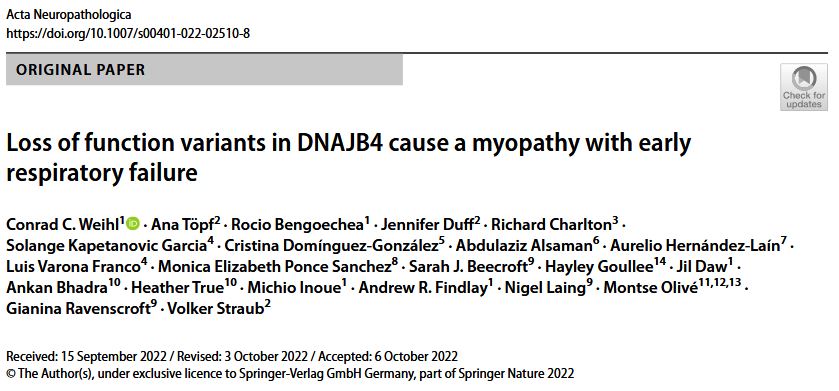
First RDMM-Europe project published
Solve-RD partners Ana Töpf and Volker Straub (John Walton Muscular Dystrophy Research Centre), together with Conrad Weihl and collaborators (Department of Neurology, Washington University School) have published their joint project in Acta Neuropathologica: "Loss of function variants in DNAJB4 cause a myopathy with early respiratory failure". Conrad Weihl was one of the first scientists that received Seeding Grant funding from Solve-RD within the European Rare Disease Models & Mechanisms Network (RDMM-Europe) to validate a novel disease-causing gene identified by Ana Töpf and Volker Straub.
Weihl, C.C., Töpf, A., Bengoechea, R. et al. Loss of function variants in DNAJB4 cause a myopathy with early respiratory failure. Acta Neuropathol (2022). https://doi.org/10.1007/s00401-022-02510-8.
Solve-RD Webinar: The Treatabolome DB
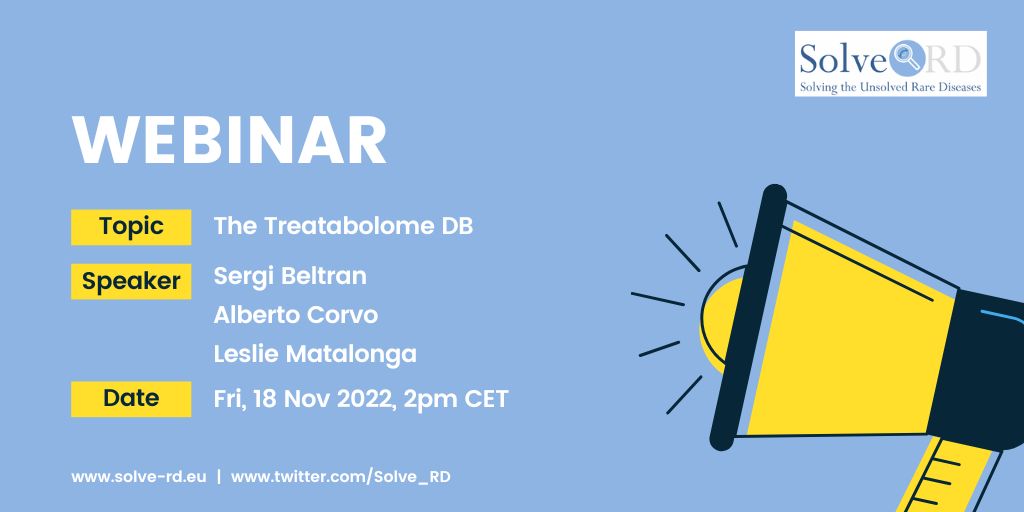
Solve-RD Webinar: The Treatabolome DB
In the last two years, the Treatabolome project, a Solve-RD initiative, promoted the collection of evidence about gene and variant-specific treatments for rare diseases. The information, gathered by experts and published in systematic literature reviews, is now stored and accessible in the Treatabolome DB. Currently, the database includes up to 180 treatments associated with more than 1000 distinct variants - mainly for neuromuscular disorders. Records are completed with clinical information by using standard vocabularies such as HPO, Orphanet, OMIM, Mesh and Chebi. The project is open to new data submissions and collaborations.
This webinar is especially relevant for people involved in rare disease diagnostics & care (clinicians, geneticists, genetic counsellors, etc). We will:
- provide an overview on the Treatabolome DB
- explain how to use the information
- show how to find a treatment for a specific genetic disease
- show how new data is being included and how you can contribute
New series on ‘Genetic Models of Rare Diseases’
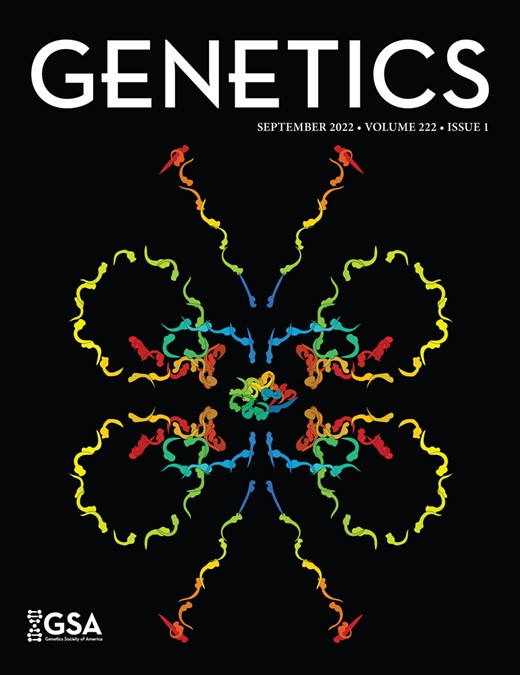
New series on ‘Genetic Models of Rare Diseases’
The journal of the Genetics Society of America, GENETICS and G3: Genes|Genomes|Genetics, are calling for submissions of papers in the area of Genetic Models of Rare Diseases.
Authors are invited to submit manuscripts by 14 November 2022. More info can be found here.
Solve-RD publication planning meeting
Tuesday, 20 September 2022, Frankfurt/Main, Germany
Periodic report RP3
Periodic report RP3
The Solve-RD periodic report for the third reporting period has just been submitted.
In the last 18 months (from 01/2021 to 06/2022), we continued to implement the activities addressing the three challenges (see here).
We reached our goal and collected 21,348 datasets (phenotypic & exome/genome sequencing data) from unsolved RD patients and their family members. Standardised phenotypic information (HPO, ORDO & OMIM encoded) has been collected via the RD-Connect GPAP PhenoStore module.
We have continued producing and enriching the Rare Disease Case Ontology (RDCO). Up to now, RDCO has been populated with 412,500 similarity associations.
Re-analysis of data freezes 1 & 2 has been done by the Data Analysis Task Force DATF working groups. Results have been prioritized and interpreted by the Data Interpretation Task Forces (DITFs) of each ERN. This collaborative effort led to the diagnosis of 511 patients from 6,003 families. This is already an 8.5 % additional diagnostic rate although many of the analyses and evaluations are still ongoing. The new re-analysis approach pursued in Solve-RD as well as the structures we established to warrant best exchange of expertise have been published in a series of papers in the EJHG in June 2021.
Service providers have been chosen for all novel omics technologies. SOPs for biomaterials have been shared with all ERN partners via the DITFs. Sample shipment is only slowly progressing; however, >3,000 samples have been sent to the central lab in Nijmegen for QC and then further distributed to the respective service providers.
The RDMM-Europe brokerage service connecting Solve-RD partners who discovered novel RD genes with model organism scientists that have the expertise to functionally validate these genes and variants opened 10 calls for Connection Applications. 36 Seeding Grants have been awarded so far.
The co-designed models for the communication of genomic results for RD have been published (Costa et al.). The main finding at both study sites in the Czech Republic and the UK was the identification of post-test care as the shared priority for improvement for both health professionals and families.
The conference ECOgenomics “European Conference on the Diffusion of Genomic Medicine: Health Economics & Policy” took place online from 26-28 May 2021. Plenary sessions and parallel thematic sessions brought together researchers from the human sciences (mainly health economics), but also researchers from other disciplines.
The Treatabolome database has been released and an API connects it to the RD-Connect GPAP to make information about treatable genes and variants of RDs accessible and to improve the visibility of existing variant-specific treatment options at the time of diagnosis to clinicians and their patients. It includes data from 10 systematic literature reviews of which six have been published in a special issue in May 2021 in the JND.
The data flow system has continuously been adapted to the project’s needs involving GPAP, the EGA, omics service providers, the sandbox and RD3. GPAP’s new Cohort App module facilitates the exploration and construction of cohorts on experiments metadata and structured clinical data using standard ontologies to improve the analysis of defined cohorts. The FUSE client enables access to files stored at the EGA via the Sandbox and also for real-time visualisation in a genome browser like IGV when analysing data in the GPAP.
MSCA Action

MSCA-PF 2022 in peripheral nerve and muscle disease at University of Antwerp, Belgium
The Peripheral Neuropathy and Translational Neurosciences groups of the µNEURO Research Centre of Excellence (University of Antwerp, Belgium) welcome expressions of interest from postdoctoral researchers with a strong scientific track record to jointly prepare a high-quality proposal for an MSCA Postdoctoral Fellowship 2022 in the field of neuromuscular disease and peripheral nerve degeneration.
More info can be found here.
Solve-RD Annual Meeting 2022
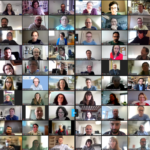
Solve-RD Annual Meeting 2022
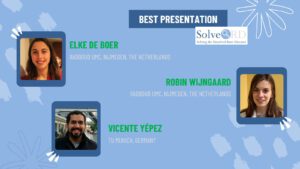
Solve-RD workshop: Navigating the Sandbox
Thu, 19 May 2022, 14:00 – 15:30 CEST, online
Continue reading “Solve-RD workshop: Navigating the Sandbox”
Racing against time: Seeking the cure for a deadly disease
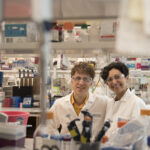
Racing against time: Seeking the cure for a deadly disease
Ten years ago, Harvard Law School student Sonia Vallabh’s world was turned upside down when her mother’s health rapidly deteriorated after initial complaints of trouble with her vision. Descending quickly into dementia, pneumonia, and disability, it was not until after the death of Sonia’s mother that a diagnosis for prion disease was confirmed. But the nightmare did not stop there — Sonia soon found out that she, too, had inherited the deadly disease.
We are very grateful that Sonia Vallabh and Eric Minikel accepted the invitation to give the keynote lecture at our Solve-RD Annual Meeting 2022! It was impressive to hear their story and to feel their determination to find a treatment for Sonia’s disease.
Prior to the meeting we have invited Sonia to share her thoughts on the future of rare disease research, as well as her own race against time to come up with a life-saving treatment. Read the full interview here.
We would like to inform you that Sonia and Eric helped to launch a prion disease registry at PrionRegistry.org. This is a tool to help recruit for clinical research and also someday, clinical trials. In the meantime, numbers from the registry help to convince partners across sectors that even though this is a rare disease, they are well organised and capable of running rigorous clinical trials. So, by signing up, patients and families help to convince the world that this disease is worth working on!
